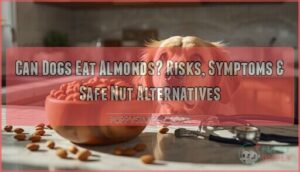This site is supported by our readers. We may earn a commission, at no cost to you, if you purchase through links.
Your dog just snatched an almond off your kitchen counter, and now you’re wondering if you need to panic. The good news is that almonds won’t poison your dog the way chocolate or grapes can. However, that doesn’t mean they’re safe.
Almonds pack a high fat content that can trigger pancreatitis, a painful inflammation of the pancreas. Their size and hardness also create choking hazards, especially for smaller breeds.
Beyond the immediate risks, regular almond snacking can lead to digestive upset, weight gain, and a trip to the emergency vet. Understanding which nuts are safe and which ones to avoid can help you make better choices for your dog’s health.
Table Of Contents
- Key Takeaways
- Can Dogs Eat Almonds?
- Are Almonds Toxic to Dogs?
- Risks of Feeding Almonds to Dogs
- Symptoms After Dogs Eat Almonds
- What to Do if Your Dog Eats Almonds
- Safe Nuts and Unsafe Nuts for Dogs
- How Much Nut is Safe for Dogs?
- Healthier Alternatives to Almonds for Dogs
- Tips for Safely Feeding Dogs Treats
- Frequently Asked Questions (FAQs)
- Conclusion
Key Takeaways
- Almonds aren’t toxic to dogs, but their high fat content (14 grams per ounce) can trigger pancreatitis, while their size and hardness create choking hazards, especially in smaller breeds.
- Dogs lack the digestive enzymes needed to break down almonds properly, leading to stomach pain, diarrhea, and potential intestinal blockages that may require emergency veterinary care.
- Even a few almonds can exceed the recommended 10% daily treat calorie limit for dogs, contributing to obesity and weight-related health problems over time.
- Safe alternatives like plain peanut butter (without xylitol), carrots, green beans, and blueberries provide better treat options that won’t stress your dog’s digestive system or pose serious health risks.
Can Dogs Eat Almonds?
No, dogs shouldn’t eat almonds. While they aren’t toxic like some other nuts, almonds create real problems for your dog’s digestive system and overall health.
Let’s look at why almonds don’t work well for dogs and what risks they bring to the table.
Almonds and Canine Digestion
Dogs lack the enzymes needed to properly digest almonds, making fiber digestion difficult. Their systems can’t break down the 4 grams of fiber per ounce effectively, leading to digestive issues and poor nutrient absorption. This enzyme deficiency creates three main problems:
- Stomach pain and discomfort from undigested almond pieces
- Loose stools that persist for several days
- Aflatoxin risk from potential mold contamination on almonds
These factors contribute to canine gastrointestinal health concerns requiring veterinary care. Additionally, frequent almond consumption can lead to potential weight gain.
Choking and Obstruction Risks
Beyond digestive issues, almonds pose serious physical dangers. Whole almonds, usually 2–3 cm long, can lodge in your dog’s esophagus or intestine, especially in small breeds. Their hard, dry texture makes them a choking hazard that won’t break down easily during swallowing.
Watch for gagging, drooling, or difficulty breathing—these emergency indicators mean immediate veterinary care is needed to prevent life-threatening esophageal blockage or intestinal obstruction.
Regularly feeding almonds can also lead to potential long-term obesity.
Fat Content and Health Impact
Even more concerning than choking is what almonds do inside your dog’s body. Each ounce packs roughly 14 grams of fat—primarily monounsaturated—and 165 calories. That’s a lot for any dog, but especially risky for breeds prone to pancreatitis.
Here’s why that matters:
- High fat content triggers pancreatic inflammation in susceptible dogs
- Almond calories add up fast, contributing to weight gain and obesity
- Fat bioavailability increases with processing (almond butter absorbs nearly completely)
- Dietary guidelines recommend treats stay under 10% of daily intake—almonds easily exceed that
Even a few almonds can push your dog’s fat consumption beyond safe levels, raising pancreatitis risk and undermining weight management efforts. That’s especially true for small dogs, where a single nut becomes a disproportionate part of their dog diet. Healthy fats in dog nutrition come from balanced, species-appropriate sources—not calorie-dense nuts.
Are Almonds Toxic to Dogs?
Almonds aren’t poisonous to dogs the way macadamia nuts or black walnuts are, but that doesn’t mean they’re safe. The real danger lies in what almonds can do to your dog’s digestive system and overall health.
Let’s look at why almonds fall into a gray area and what specific risks you need to watch out for.
Difference Between Toxic and Non-Toxic Nuts
Not all nuts affect your dog the same way. Toxic nut syndromes—like those from macadamia nuts—cause weakness and tremors, while safe nuts for dogs, such as peanuts and cashews, simply carry calorie risks. Almonds fall in between: they’re not toxic, but obstruction versus toxicity matters here.
Practical safety guidelines focus on mycotoxin neurological effects from moldy varieties and choking hazards rather than true toxicity risks.
Dangers of Moldy or Flavored Almonds
When almonds grow moldy, mycotoxins trigger vomiting, tremors, and potentially fatal liver damage in dogs—even if you don’t see visible mold.
Flavored varieties bring their own threats: sodium overload stresses kidneys, garlic or onion seasonings destroy red blood cells, and xylitol risks cause seizures and liver failure.
These toxic foods turn a questionable snack into a genuine emergency for your pup.
Risks of Feeding Almonds to Dogs
While almonds aren’t toxic, they can cause real problems for your dog. The high fat content and poor digestibility create health risks you should understand before your pup gets into your snack stash.
Let’s look at the three main concerns when dogs eat almonds.
Gastrointestinal Distress and Pancreatitis
Your dog’s gut wasn’t built to break down almonds. Dogs lack the digestive adaptations to process these nuts efficiently, leading to vomiting, diarrhea, and painful gas.
More seriously, almonds pack around 50% fat by weight—a fat overload that can trigger pancreatitis, an inflammation of the pancreas. Small breeds face higher breed susceptibility since they receive a larger relative dose per pound of body weight.
Vomiting, Diarrhea, and Lethargy
Within 2–12 hours of eating almonds, dogs often show vomiting, diarrhea, and lethargy—pancreatitis signs your vet will recognize. About 20–30% of cases involve vomiting, with stool changes following within 24 hours.
Abdominal pain, repeated episodes, blood in vomit, or worsening weakness require emergency care. Small breeds face dehydration risks quickly, so monitor closely and call your veterinarian if symptoms persist.
Obesity and Weight Gain
Even a few almonds can tip the scales. With 59% of U.S. dogs already overweight or obese, high-fat snacks like almonds pack around 7 calories each—calories that add up fast. Stick to the 10% treat guideline: for a 30-pound dog, that’s roughly 60 calories daily from all treats combined.
- Calorie contribution matters: Almonds deliver concentrated energy, making weight gain easy if you offer them often.
- High-fat diets raise obesity risk: Dogs fed fatty foods develop more body fat than those on balanced canine diets.
- Owner perception can mislead: Many pet parents underestimate their dog’s weight, missing early warning signs.
- Treat guidelines protect health: Keeping dog treats under 10% of daily calories helps prevent excess pounds.
- Weight management starts now: Choose healthy snacks like carrot sticks to avoid long-term obesity and its complications.
Symptoms After Dogs Eat Almonds
If your dog gets into almonds, you’ll want to watch for specific signs that something’s wrong. Most symptoms show up in the digestive system, but some warning signs need immediate attention.
Here’s what to look for after your dog eats almonds.
Signs of Digestive Upset
Your dog’s stomach doesn’t keep secrets—it’ll tell you when something’s wrong. After eating almonds, watch for vomiting within 24 hours, diarrhea that’s greasy or pale, and abdominal pain shown by a hunched posture. Dehydration signs like dry gums or lethargy can appear fast. Most symptoms pop up within a day of ingestion.
| Symptom | What to Watch For |
|---|---|
| Vomiting | Single episodes or repeated over 12–24 hours |
| Diarrhea | Greasy, pale stools within 6–24 hours |
| Abdominal Pain | Hunched “prayer position,” tender belly |
| Dehydration | Dry gums, sunken eyes, excessive thirst |
| Lethargy | Low energy lasting beyond a few hours |
Loss of Appetite and Gas
Your pup might turn up their nose at dinner after snacking on almonds—a red flag for almond intolerance or pancreatitis onset. Loss of appetite paired with gas signals digestive discomfort from poor nut digestion.
Mild cases improve within 12–24 hours, but if symptom duration stretches beyond a day or food allergies worsen, veterinary intervention becomes critical to rule out serious digestive issues affecting your dog’s health.
Emergency Warning Signs
When gas and appetite loss escalate, breathing difficulty or severe vomiting demand urgent veterinary care. Systemic collapse and dehydration signs like sunken eyes, along with repeated retching, signal time sensitivity—small dogs face amplified toxicity risks from almonds due to their size.
Watch for these red flags:
- Cyanosis or noisy breathing
- Vomiting more than twice per hour
- Extreme lethargy or inability to stand
- Pale gums or excessive drooling
- Hunched posture with abdominal pain
Contact your vet immediately if food allergies or pancreatitis symptoms appear.
What to Do if Your Dog Eats Almonds
If your dog snags a few almonds, don’t panic, but do pay attention to what happens next. The steps you take depend on how many almonds were eaten and whether your dog shows any troubling signs.
Here’s what you need to know to handle the situation safely.
Immediate Steps for Owners
If your dog snags almonds, don’t panic—but act fast. Assess ingestion details right away: how many almonds, what type, and your dog’s size matter.
Evaluate symptoms like vomiting or lethargy immediately. Contact professionals—your vet or Pet Poison Helpline—within minutes. They’ll guide you on vomiting induction if needed.
Home monitoring starts now: watch closely, offer water, and track changes. Your swift response reduces toxicity risks.
When to Contact a Veterinarian
Knowing when a situation demands veterinary advice and guidance makes the difference. Call your vet immediately if severe symptoms emerge—vomiting more than twice hourly, difficulty with breathing problems, or abdominal pain signaling pancreatitis.
Quantity thresholds matter: small breeds eating several almonds face heightened toxicity risks. Systemic signs like lethargy or loss of appetite warrant professional dog health evaluation.
Emergency protocols include contacting ASPCA Poison Control at 888-426-4435 for expert veterinary care and advice.
Monitoring and Follow-Up
After reaching out for veterinary advice and guidance, pet owners need careful observation for 24 to 48 hours. Track symptom progression—vomiting frequency, behavioral changes, appetite shifts. Monitor key signs: breathing patterns, hydration, energy levels.
Dietary adjustments help dogs recover: small, low-fat meals support healing.
Long-term health depends on preventing future almond exposure and maintaining regular check-ins with your vet.
Safe Nuts and Unsafe Nuts for Dogs
Not all nuts are created equal regarding your dog’s safety. Some can be offered as occasional treats, while others should never make it into your pet’s bowl.
Let’s break down which nuts get the green light and which ones you need to keep far out of paw’s reach.
Nuts Dogs Can Eat (Peanuts, Cashews, Chestnuts)
Not all nuts are off-limits. Peanuts, cashews, and chestnuts can be safe for dogs in tiny amounts if they’re plain, unsalted, and shelled. Each offers some nutritional benefits, like healthy fats and vitamins, but high fat content means serving suggestions matter.
Preparation methods are key—avoid seasonings or coatings. While allergy concerns and breed sensitivity are rare with these nuts, moderation prevents digestive upset.
Nuts to Avoid (Macadamia, Black Walnuts, Pecans)
Some nuts pose serious toxic nut effects you can’t ignore. Macadamia nuts cause weakness and tremors within 12 hours, even at small doses. Black walnuts contain juglone, triggering walnut poisoning with vomiting and seizures. Pecans carry similar pecan dangers, plus mold-related risks.
These foods toxic to dogs create genuine macadamia risks and other life-threatening reactions requiring immediate veterinary care.
Hazards of Salted or Seasoned Nuts
Even when almonds themselves aren’t toxic, salt toxicity from salted varieties creates serious dangers for your dog. Seasoning dangers multiply when garlic or onion coatings trigger anemia risk.
High sodium levels contribute to kidney complications and cardiac risks, especially in smaller breeds. A 10-kg dog can develop toxicity from just 20-30 grams of salt equivalent, making unseasoned nuts the only remotely safer choice.
How Much Nut is Safe for Dogs?
If you’ve decided to offer your dog a safe nut as an occasional treat, portion control matters more than you might think. The key is keeping servings small and infrequent to avoid weight gain and digestive trouble.
Here’s what you need to know about serving sizes, calorie limits, and how often nuts can safely fit into your dog’s diet.
Recommended Serving Size
The truth is simple: the safest almond serving for your dog is zero. Veterinary nutrition experts don’t recommend intentionally feeding almonds to dogs at all.
Veterinary nutrition experts agree: the safest serving of almonds for your dog is zero—none at all
If your healthy, medium-sized dog accidentally snags one or two plain, unsalted almonds, it’s unlikely to cause harm—but that doesn’t make them a treat worth sharing on purpose.
Calorie and Fat Considerations
Consider the numbers: one ounce of almonds packs about 165 calories and 14 grams of fat. That’s a lot for a dog. Hidden calories add up fast.
Veterinary guidelines say treats shouldn’t exceed 10% of your dog’s daily calorie needs. For a small dog eating 300 calories per day, that’s only 30 calories for all treats combined—just five almonds would blow past that limit.
Frequency and Moderation Tips
How often should you offer almonds? The answer is simple: rarely, if ever. Even safe nuts should stay occasional. Veterinary advice emphasizes that all treats, including almonds, must respect daily calorie counting and portion control rules.
- Limit nut treats to once or twice weekly at most
- Swap out some kibble when adding calorie-dense extras
- Track weekly frequency to avoid accidental overfeeding
- Adjust treat limits based on your dog’s weight and activity
Dogs thrive on balanced dog nutrition and health routines. When you’re planning your dog diet and choosing dog treats, remember that moderation protects against pancreatitis and obesity. Small portions keep tails wagging safely.
Healthier Alternatives to Almonds for Dogs
If almonds aren’t a great choice for your dog, you might wonder what treats are actually safe and healthy. The good news is there are plenty of better options that won’t upset your dog’s stomach or put them at risk.
Let’s look at some smart alternatives that keep tails wagging without the worry.
Safe Fruits and Vegetables
Your dog doesn’t need nuts when fruits and vegetables make excellent, safer alternatives. Carrots, green beans, and broccoli are safe vegetables that won’t stress your dog’s digestive system. Blueberries, apples (seeds removed), and bananas offer fruit benefits without the fat content of almonds.
Stick to treat guidelines—no more than 10% of daily calories—for calorie control. Always skip toxic produce like grapes, onions, and garlic to protect your dog’s health.
Nut-Free Commercial Treats
Commercial dog treats offer safer ingredient alternatives than almonds, with brands like Greenies and Milk-Bone dominating the market. When comparing formulations, look for limited-ingredient options if your dog has allergy considerations.
The natural dog treats market, valued at $3 billion and growing 11% annually, provides plenty of nut-free choices. Always check labels to confirm treats contain dog-safe ingredients without harmful additives.
Peanut Butter Without Xylitol
Peanut butter makes a tasty dog treat, but you’ll need to avoid anything with xylitol—a sweetener that’s poisonous to dogs. Stick with natural brands listing just peanuts and maybe salt.
Since peanut butter packs about 90 calories per tablespoon, measure carefully: half a teaspoon for small dogs, up to two teaspoons for larger ones. When in doubt, ask your vet.
Tips for Safely Feeding Dogs Treats
Treating your dog doesn’t have to come with risk if you know what to look for. The right snacks can keep your dog healthy and happy, while the wrong ones can lead to unnecessary trips to the vet.
Here’s what you need to know to make smart choices about what goes into your dog’s bowl.
Choosing Dog-Friendly Snacks
Looking at dog treats on store shelves can feel overwhelming, but you don’t need a degree in pet nutrition to make smart choices. Start by checking treat ingredient sourcing—meat should top the list.
Choose calorie-controlled portions to prevent weight gain, especially if your dog already enjoys other healthy snacks for dogs.
For dogs with sensitivities, allergen-free treats or homemade treat recipes work well. Dental health treats can double as functional snacks.
Avoiding Additives and Shells
When you’re picking treats, skip anything with xylitol—this artificial sweetener can cause life-threatening drops in blood sugar. Salted or seasoned nuts deliver dangerous sodium loads and toxic flavorings like garlic powder.
Shell fragments pose serious obstruction risks, especially in the esophagus or intestines. Stick to plain, unsalted options and always remove shells before offering any safe alternatives to almonds.
Consulting Your Veterinarian
Before introducing any new treats to your dog’s diet, you should ask your veterinarian for guidance on safe options and portion sizes.
This veterinary advice for dogs becomes critical if emergency symptoms like vomiting or lethargy appear after almond ingestion. Your vet can recommend diagnostic tests, poison control resources, follow-up care, and dietary changes specific to your dog’s health needs and owner responsibilities.
Frequently Asked Questions (FAQs)
Are almonds bad for dogs?
While almonds won’t poison your dog outright, they’re still bad news. Dogs can’t digest them well, and the high fat content invites pancreatitis, choking hazards, and gastrointestinal distress.
Can dogs eat almond butter?
Plain almond butter without xylitol or chocolate can be an occasional treat, but its high fat content raises pancreatitis risk.
Always check labels for xylitol dangers and practice strict portion control.
Can dogs eat nuts?
Most nuts aren’t straightforward dog treats. Peanuts and cashews offer nutritional benefits when plain, but macadamia nuts pose serious toxicity risks.
Breed sensitivity, preparation methods, and allergy concerns matter when choosing safe dog treats over almonds.
Can Great Danes eat almonds?
Great Danes shouldn’t eat almonds. Their size doesn’t reduce digestion challenges, obstruction potential, or pancreatitis risk from high fat content.
Veterinary advice emphasizes safe alternatives like dog-formulated treats to protect canine health from toxicity risks.
Can dogs eat almond milk?
While almond milk isn’t toxic to dogs, many brands contain xylitol—a dangerous sweetener that causes hypoglycemia and liver failure. Plain, unsweetened versions may cause digestive upset, so skip this milk alternative entirely.
Can dogs eat nut shells?
No—nutshells are indigestible and pose serious choking hazards, GI irritation, and obstruction risks.
Shells can splinter, causing digestive issues, and may harbor mold concerns.
Veterinary guidance strongly advises removing all shells before offering any nuts to dogs.
Can dogs eat almonds?
Dogs can technically eat almonds, but it’s not a good idea. While almonds aren’t toxic like macadamia nuts, their high fat content, choking dangers, and poor digestibility make them unsafe snacks for your dog.
Can dogs eat cashews and almonds?
Your pup shouldn’t snack on almonds because they’re tough to digest and can cause stomach upset or blockages.
Cashews are safer in tiny amounts—think one or two for small dogs, unsalted and plain only.
Can dogs eat salted nuts?
No, salted nuts aren’t safe for your dog. The sodium can trigger hypernatremia, causing kidney strain, dehydration, and potentially seizures.
Veterinary guidance strongly warns against salted nut dangers—stick with unsalted options only.
What nuts can dogs eat?
In small amounts, plain peanuts, cashews, and pine nuts won’t harm your dog. Chestnuts work too, but skip macadamia nuts, black walnuts, and pecans—they’re genuinely dangerous for dogs.
Conclusion
Like the old saying goes, “an ounce of prevention is worth a pound of cure.” As for whether dogs can eat nuts almonds, prevention means keeping them out of reach entirely. Their risks outweigh any nutritional benefit.
Stick to dog-safe treats like unsalted peanut butter or plain vegetables instead. Your dog doesn’t need almonds to thrive—just your attention to what’s truly safe. That’s the smartest choice you can make.
- https://www.akc.org/expert-advice/nutrition/can-dogs-eat-almonds/
- https://bdingredients.com/nutrition-information/
- https://theparcvet.com/blog/fatty-holiday-foods-can-mean-pancreatitis-pets
- https://www.aspca.org/news/animal-poison-control-alert-macadamia-nuts-are-toxic-dogs
- https://www.aspcapro.org/sites/default/files/x-toxbrief_0402.pdf

















